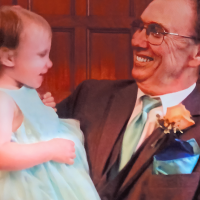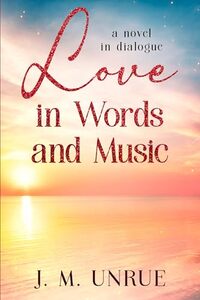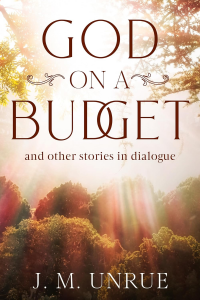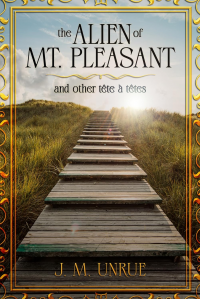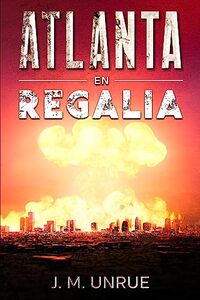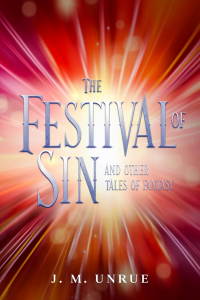J. M. Unrue Interview Published on: 03, Apr 2024
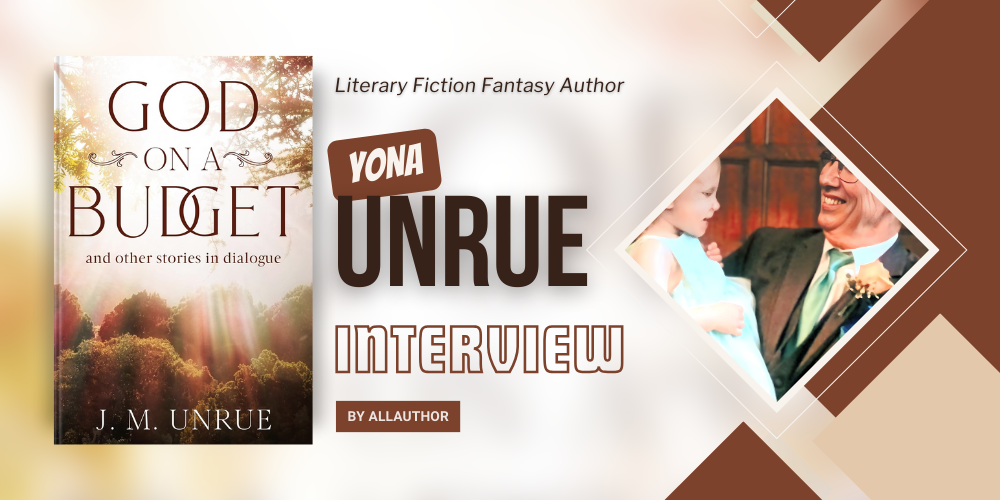 Can you tell us a bit about yourself and how you got started in writing?
Can you tell us a bit about yourself and how you got started in writing?
I started when I was young, of course, but it was hit-and-miss for many years. I had to make a living and help raise three daughters. I really didn’t have the luxury of time to focus until my forties but I had a lot of partially finished stories and story ideas collected by then.
What draws you to explore social issues through fiction rather than other mediums?Putting social issues as part of a storyline makes it a personality trait and not me telling anyone else how to live. I can explore biases and what I consider to be any absence of introspection through a character. The key is to not make anyone a stereotype or a non-human.
The second part is that by applying satire within a fiction framework, it’s easier to make a point without sounding preachy.
I’ll give a quick example. In my novel Atlanta en Regalia there’s an encounter between a good ‘old boy and a store clerk who is Hispanic. He claims to not be able to understand her and admonishes her to speak English—like American English. Turns out she’s a native-born American from Miami, so his objection is really about something else.
The irony is that he couldn’t understand someone from New Jersey, either, and probably couldn’t be understood by many non-Southerners. His particular bias is sadly in vogue these days.
Your writing is often described as "skewering convention one book at a time." Could you elaborate on what conventions you enjoy challenging in your work?First, all my books are different. My books would appeal to a lot of different people, just not the same people for every book.
I did not learn to write in an institution. I was not taught how to write. I don’t write genre fiction and I am apt to stretch conventional norms. Some of this is ego, sure, but I’ve spent a lot of time developing my own voice.
Regarding subject matter, I find things that trouble me and try to show the irony—and in a humorous way if possible.
I enjoy challenging our political sensibilities and our definitions of spirituality, especially when they are combined. The fact that any individual willing to do whatever it takes to get elected is by its nature anti-spiritual, yet somehow this is overlooked. I think politics has become more important than faith, if the core tenets of a faith are abandoned in the process. I suppose if there is an underlying theme to the conventions I satirize it’s people’s willingness to ignore gross inconsistencies if they tend to agree with a particular sentiment.
Another thing. People drifting away from facts and buying into hearsay and conspiracy theories may seem like stereotypically easy targets for satire, but it does show a certain intellectual sloth. People tend not to delve deeper when they land on something palatable to them.
Your short story collections span various themes, from social satire to life in America. How do you decide on the themes and topics for each collection?I had a slew of stories that were fairly easy to catalogue into various themes. Sometimes you have to look for the related themes but I really don’t think that matters. They are not mutually exclusive. Satire is part of Americana.
I am aware of history. I haven’t delved too far into the past in my writing but I try to convey a sense of how something evolved to that point in time.
I am also a romantic, sentimental person. So certain stories reflect that. Sometimes a story needs a straightforward, emotional approach, and when I have one of those, I play it straight so to speak.
One of the underlying themes in everything I write is a sense of self-deprecating humor—people aware of their own foibles but still possess a measure of grace.
In your sci-fi/fantasy collection, how do you blend elements of speculative fiction with your signature style of social commentary?Well, I think people will still have much the same tendencies a few hundred years from now. We will become smarter but maybe not proportionally wiser. This is the only sci-fi/fantasy material I’ve written. I played it straight for the most part. There are object lessons, and even humor, but not true satire. The three-part foundation story The Festival of Sin is a fish-out-of-water story and we all feel that way at times. That allows for exposing and reconciling cultural differences, and there is irony to be found in that. Irony informs both social satire and technological evolution. Our history is rife with trial-and-error, and some of this makes us wonder how we survived this long.
Could you share insights into your approach to character development in your novels? How do you create characters that resonate with readers while also serving the narrative?I don’t have the credentials to teach writing but the few occasions I’ve had to address aspiring writers I advise them to base every character on someone they know, even composites of people, and traits. Character continuity is crucial. The easiest way to make a character real is to have a real frame-of-reference.
I based one character using my grandfather’s voice, my high school track coach’s bearing, and the overall physical appearance of a Scottish actor I saw in a movie once. It sounds preposterous, but I always know if I’ve strayed from the character because he is real to me.
All my characters are warts and all people. Even heroes are human.
How do you strike a balance between entertainment and provocation in your writing?Provocation is best illustrated in how a character responds to certain events. Dialogue then allows the reader to know how honest that person is. Provocation often happens not because of what a character does but what he doesn’t do.
Entertainment comes from the sequence of events itself. It’s easiest if you have an engaging storyline. One of my stories, The Cabbage Patch, (from The Festival of Sin) is social satire, which is provocative, but the story stands on its own as far as entertainment value goes.
The storyline is about a handful of coma patients who find themselves in the same out-of-body netherworld and interacting—while hoping to wake up. So, the storyline offers entertainment value because it’s an interesting story. Provocation, if that’s really the right word, comes from a response to character differences. Like people stranded in a lifeboat. We can’t realistically expect them to be of one mind simply because they share the same space. You can’t erase ingrained behavior or perspective no matter the situation.
Any unique story is entertaining. Having characters who represent different viewpoints can be provocative regardless of the setting.
I write a pretty decent jerk. I also write a pretty decent romantic.
Your books are available on numerous online platforms. How has the digital landscape influenced your approach to publishing and reaching your audience?I have priced all my eBooks under two bucks. So anybody can get my books without spending a lot of money in case they discover they can’t relate. People who want to get a printed copy can do that, of course, but I want everyone to have easy access. I’m not sure if that’s the right approach, but I never want anyone to feel that they’ve wasted money on anything I’ve written. Worst case, it’s not much money. v
If people have to read a section more than once to get it, that’s okay. I definitely want people to be entertained. I also want them to be impressed.
Can you discuss the role of humor in your works, particularly in addressing serious topics or societal norms?Well, that’s what satire does. Takes a serious topic, points a flashlight at it, and gives it a megaphone. There is humor in almost anything humans experience. Satire works if it has a ring of truth. Cheap shots are when something is dishonest or gloats about someone’s misfortune not of their own making. I also poke fun at myself. Some of my characters get themselves in jams in ways that I have in the past. Self-deprecating humor is nearly always funny if it’s sincere. There is too much vitriol in the world and we need to stop it. When you find a way to laugh about a serious topic, I think it adds value, may even make us think about it in a more productive way.
What challenges do you encounter when writing satire, and how do you navigate them?Not to be cruel or mean-spirited. The rule-of-thumb for me is asking if I’m doing any real damage I don’t ever want to write a polemic even if the person or issue represents something intolerable to me. As I said, being aware of my own foibles keeps me honest. I try not to demean people. I’ve crossed the line a few times, I know, but knowing when I cross the line is as important a part of the process as writing. I don’t want to call a person or an idea idiotic. What I want to do is show how the thinking that influenced behavior and the end result might contain irony and a why didn’t you see this coming? aspect.
Your stories often offer insightful commentary on contemporary society. How do you stay attuned to current events and societal shifts to inform your writing?I’ve lived over sixty years now. I’m not a kid anymore. I also tend to be introspective. I mull things and weigh things. I make an effort to understand. I try not to jump to conclusions or have kneejerk responses. I trust my instincts when something does not ring true. I can spot a phony a mile away. I wish I didn’t. I’m not a pessimist but I do tend to see the ugliness first and have to work to mitigate that. Neither do I put a happy face on what I perceive as wrongness. There are reasons for people to be who they are and understanding that helps me expose my version of the truth without attacking anyone’s personhood.
Let’s face it, there’s a lot of weird stuff in our current cultural environment.
Could you share any memorable reader reactions or interactions you've had regarding the themes (I made themes plural as it is a story compilation) explored in your book, "God on a Budget: and other stories in dialogue"?I wrote a short story a while back entirely in dialogue (Jesus and Buddha in the Garden of Eden). The response was very positive. It’s harder than it sounds. Spoken dialogue in a visual format is nuanced by actors’ performance. Writing that nuance without visual clues is a huge challenge.
Admittedly, there’s some ego involved here. I had nine story ideas and I decided to write them in dialogue simply to see if I could pull it off. I figured if I was pleased with the result, that would be enough.
The nicest thing people have said is that almost everything is easy to follow. They don’t get lost about who is saying what, when. Essentially, all these stories are two-person conversations, and a lot of direction has to be implied in the spoken word.
Admittedly, it’s an odd way to go about things, but I guess I’m a little odd, too.
How do you approach crafting dialogue that feels authentic to your characters while also serving your narrative goals?There are two challenges. First, have the characters fully developed in your head. Know what they look like, sound like, are apt to behave, even if there is no descriptive narrative. Make the words ring true to that character.
Make your point without being shrill or over-the-top.
Response to an environment, state of mind, situation. That serves the narrative without being narrative.
Sometimes the setting frames the dialogue without having to use a lot of narrative.
One of the stories in God on a Budget is set in a hospice. Another is set in a prison visiting area. You don’t have to go into a lot of narrative detail to have a sense of what’s happening with the characters. v Looking ahead, what themes or topics are you excited to explore in your future works?
Well, this is hard. I don’t know how much more I’ll write. I’ve produced eight books of fiction. This happened in a relatively short time, so people think I’m prolific. The truth is that I’d mulled all these stories for twenty years. Now, God on a Budget is all new, conceived in the last two years and published early in 2024.
The basics of some of the other books are over thirty years old.
I’ve got a couple of story ideas and a new novel concept, but am not there yet. Also, my energy level is not where it needs to be to write. I’m working on it.
When did you join AllAuthor? What do you think of the experience so far? Do you have any feedback?I joined AllAuthor last year, and to gain more exposure. It’s still hard to convey who you are and what you’re about. There are tens of thousands of us out there. If I reach a few people, then it’s worth it. Frankly, I don’t know what else to do.
Oprah won’t return my calls. Maybe I should try Hoda.
Share J. M. Unrue's interview
J. M. Unrue is a versatile writer specializing in non-genre fiction. With a penchant for social satire, J. M. Unrue fearlessly skewers convention with each literary endeavor. Across various online platforms, readers can easily access J. M. Unrue's works, each accompanied by vivid descriptions offering a glimpse into his thought-provoking narratives.
